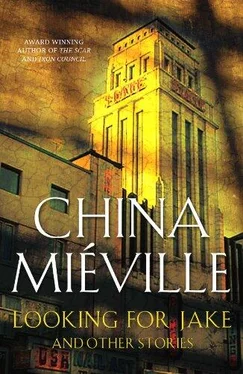They can’t escape it, of course, what’s happening to the city. Signs of it abound.
With so many people gone the city is generating its own rubbish. In the cracks of buildings and the dark spaces under abandoned cars little knots of matter are self-organising into grease-stained chip wrappers, broken toys, cigarette packets, before snapping the tiny umbilicus that anchors them to the ground and drifting out across the streets. Even on Oxford Street every morning sees a fresh crop of litter, each filthy newborn piece marked with a minuscule puckered navel.
Even on Oxford Street, every day without fail in front of the newsagents, the bundles appear: the Telegraph and Lambeth News. The only papers to survive the quiet cataclysm. They are generated daily, written, published, and delivered by person or persons or forces unseen.
I already crept downstairs today, Jake, to pick up my copy of the Telegraph from across the road. The headline is “Autochthonic Masses Howling and Wet-Mouthed.” The subhead: “Pearl, Faeces, Broken Machines.”
But even with these reminders, Oxford Street is a reassuring place. Here, people get up and go to work, dress in clothes we would recognise from nine months ago, have coffee in the morning, and resolutely ignore the impossibility of what they are doing. So why don’t I stay there?
I think it’s the invitation from the Gaumont State that keeps me here, Jake.
I can’t leave Kilburn behind. There are secrets here I haven’t found. Kilburn is the centre of the new city, and the Gaumont State is the centre of Kilburn.
The Gaumont was inspired, preposterously, by New York’s Empire State Building. On a miniature scale, perhaps, but its lines and curves are dignified and impassive and easily ignore the low brick-and-dirt camouflage of their surroundings. It was still a cinema when I was a child, and I remember the symmetrical sweep of the twin staircases within, the opulence of chandelier and carpet and marble tracings.
Multiplexes, with their glorified video screens and tatty decor, are unimpressed by cinema. The Gaumont is of an age when film was still a miracle. It was a cathedral.
It closed and grew shabby. And then it opened again, to the electronic chords of slot machines in the vestibule. Outside, two huge neon standards explained the Gaumont’s new purpose in vertical script, reading downwards: BINGO.
You were my first thought, as soon as I knew something had happened. I don’t remember waking when the train pulled into London. My first memory is stepping off the carriage into the evening cool and feeling afraid.
It was no ESP, no sixth sense that told me something was wrong. It was my eyes.
The platform was full, as you would expect, but the crowd moved like none I had ever seen. There were no tides, no currents moving to and from the indicator board, the ticket counter, the shops. No fractal patterns emerged from this mass. The flap of a butterfly’s wing in one corner of the station would create no typhoons, no storms, not a sough of wind anywhere else. The deep order of chaos had broken down.
It looked as I imagine purgatory must. A huge room full of vacant souls milling atomised and pointless, each in personal despair.
I saw a guard, as alone as all the others.
What’s happened? I asked him. He was confused, shaking his head. He would not look at me.
Something’s happened, he said. Something . . . there was a collapse . . . nothing works properly . . .
there’s been a . . . a breakdown . . .
He was being very inexact. That wasn’t his fault. It was a very inexact apocalypse.
Between the time I had closed my eyes on the train and the time I had opened them again, some organising principle had failed.
I’ve always imagined the occurrence in very literal terms. I have always envisaged a vast impossible building, a spiritual power station with an unstable core shitting out the world’s energy and connectivity.
I’ve always envisaged the cogs and wheels of that unthinkable machinery overheating, some critical mass being reached . . . the mechanisms faltering and seizing up as the core explodes soundlessly and spews its poisonous fuel across the city and beyond.
In Bhopal, Union Carbide vomited up a torturing, killing bile. In Chernobyl the fallout was a more insidious cellular terrorism.
And now Kilburn erupts with vague entropy.
I know, Jake, I know, you can’t help smiling, can you? From the awesome and terrible to the ridiculous.
The walls here are not stacked high with corpses. There is rarely any blood when the inhabitants of London disappear. But the city’s winding down, Jake, and Kilburn is the epicentre of the burnout.
I left the guard alone in his confusion.
Got to find Jake, I thought.
You’re probably smiling self-deprecatingly when you read that, but I swear to you it’s true. You’d been in the city when it happened, you had seen it. Think of it, Jake. I was asleep, in transit, neither here nor there. I didn’t know this city, I’d never been here before. But you’d watched it being born.
There was no one else in the city for me. You could be my guide, or we could at least be lost together.
The sky was utterly dead. It looked cut out of matte black paper and pasted above the silhouettes of the towers. All the pigeons were gone. We didn’t know it then, but the unseen flapping things had burst into existence full-grown and ravenous. In the first few hours they swept the skies quite clean of prey.
The streetlamps were still working, as they are now, but in any case there was nothing profound about the darkness. I wandered nervously, found a telephone box. It didn’t seem to want my money but it let me make the call anyway.
Your mother answered.
Hello, she said. She sounded listless and nonplussed.
I paused for far too long. I was groping for new etiquette in this new time. I had no sense of social rules, and I stammered as I wondered whether to say something about the change.
Is Jake there please? I finally said, banal and absurd.
He’s gone, she said. He’s not here. He went out this morning to shop, and he hasn’t come back.
Your brother came on the line then and spoke brusquely. He went to some bookshop, he said, and I knew where you were then.
It was the bookshop we found on the right as you leave Willesden Green station, where the slope of the high road begins to steepen. It is cheap and capricious. We were seduced by the immaculate edition of Voyage to Arcturus in the window, and entertained by the juxtaposition of Kierkegaard and Paul Daniels.
If I could have chosen where to be when London wound down, it would be in that zone, where the city first notices the sky, at the summit of a hill, surrounded by low streets that let sound escape into the clouds. Kilburn, ground zero, just over the thin bulwark of backstreets. Perhaps you had a presentiment that morning, Jake, and when the breakdown came you were ready, waiting in that perfect vantage point.
It’s dark out here on the roof. It’s been dark for some time. But I can see enough to write, from deflected streetlamps and maybe from the moon, too. The air is buffeted more and more by the passage of those hungry, unseen things, but I’m not afraid.
I can hear them fighting and nesting and courting in the Gaumont’s tower, jutting over my neighbours’
houses and shops. A little while ago there was a dry sputter and crack, and a constant low buzz now underpins the night sounds.
I am attuned to that sound. The murmur of neon.
The Gaumont State is blaring its message to me across the short, deserted distance of pavement.
I am being called to over the organic nonsense of the flyers and the more constant whispers of young rubbish in the wind.
Читать дальше












